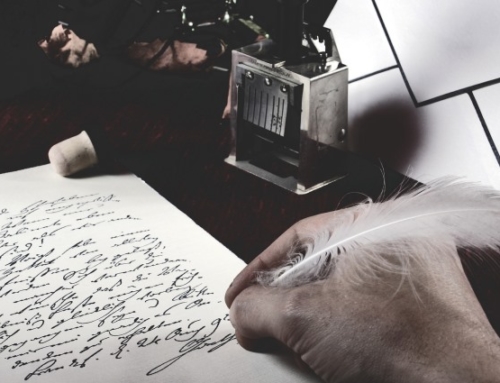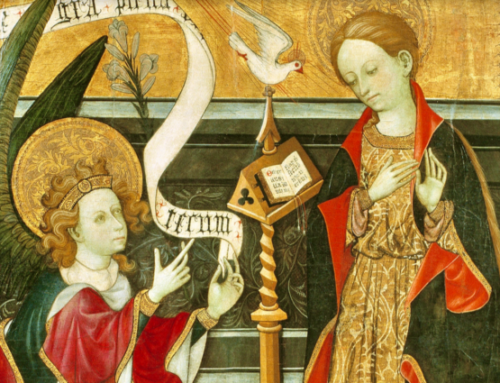Today, discovery of one’s identity often comes close to the edge of despair as we wonder if we are adrift in a meaningless sea, at the mercy of finding a piece of driftwood to which we can cling. How can identity be self-determined? And if I must create it for myself, how far and long must I travel to find the components and traditions I want to include in my identity?
 How long must I do what I am doing for it to be genuine? How can I be genuine? What does it mean to be “real”? These questions were part of our wide-ranging conversation as we dug carrots this past Thanksgiving. Plying the frozen Michigan soil with our spades, we were soon warm, that farmer and I. Was he a “real” farmer? After all, wasn’t he technically a seminary scripture professor—the 100 acres of farmland, the animals, and the large farmhouse filled with boisterous children had nothing to do with his profession, officially sanctioned by a PhD. But was the past decade of farm labor meaningless? Could he call himself a farmer? If so, how long had he been one? Questions of this sort exercise all of us, regardless of our walks of life. When can we be certain of being authentically what we are or want to be?
How long must I do what I am doing for it to be genuine? How can I be genuine? What does it mean to be “real”? These questions were part of our wide-ranging conversation as we dug carrots this past Thanksgiving. Plying the frozen Michigan soil with our spades, we were soon warm, that farmer and I. Was he a “real” farmer? After all, wasn’t he technically a seminary scripture professor—the 100 acres of farmland, the animals, and the large farmhouse filled with boisterous children had nothing to do with his profession, officially sanctioned by a PhD. But was the past decade of farm labor meaningless? Could he call himself a farmer? If so, how long had he been one? Questions of this sort exercise all of us, regardless of our walks of life. When can we be certain of being authentically what we are or want to be?
The most fundamental question of authenticity, however, is one that we often forget: are we human or not? The beautifully simple thing about this is that, while we can cultivate our humanity by making it conform more to the essence of man revealed to us through philosophy and religion, the simple fact of our existence as men and women gives us a fundamental authenticity. Recognizing the character and nature of being human gives us the opportunity to accept it and thereby cultivate it. Yet, as I have pointed out elsewhere, this involves the acceptance of not being many things we might wish to be. In his poem “The Last Ship”, J.R.R. Tolkien’s character Firiel struggles with this fact. According to Tolkien’s Elvish etymology, Firiel means “mortal woman.” Waking early one morning she beholds the last ship of Elves journeying to “Elvenhome,” the “mortal fields” of “Middle Earth forsaking.” The Elves invite Firiel— to join them, but her humanity holds her back from following the destiny of another race:
Firiel looked from the river bank,
one step daring
then deep in clay her feet sank,
and she halted staring.
Slowly the elven ship went by
whispering through the water:
‘I cannot come!’ they heard her cry.
‘I was born Earth’s daughter!No jewels bright her gown bore,
as she walked back from the meadow
under roof and dark door,
under the house-shadow.
She donned her smock of russet brown,
her long hair braided,
and to her work came stepping down.
Soon the sunlight faded.
Stepping toward the ferry to immortality, the foot of “Earth’s daughter” sinks in the clay of her mortality. When she returns to her house, her former “gleaming / with free hair in the morning’s flame / on her shoulders streaming” is tamed with a braid, and her gown, jeweled with dew, is changed covered with the “russet brown” of earth’s fading leaves, dirt, and stone. Firiel must come to terms with her humanity. Although Tolkien does not develop this point, I would argue that coming to terms with her mortal womanhood will provide Firiel with an authenticity that could not have been hers had she journeyed with the Elves.
I think the poet Richard Wilbur, in his poem “Mayflies” touches on this theme as well. He describes seeing “In somber forest, when the sun was low” a swarm of mayflies arising from a pond, and wonders at their order and fragile beauty that will last for only a few hours:
Watching those lifelong dancers of a day
As night closed in, I felt myself alone
In a life too much my own,
More mortal in my separateness than they–
Unless, I thought, I had been called to be
Not fly or star
But one whose task is joyfully to see
How fair the fiats of the caller are.
For Wilbur, the possibility of joy is only available when he admits to being not “fly or star” but a beholder of creation. Or, put differently, a man exercising his uniquely human faculty of perceiving the beauty of God in creation. Neither as animal or angel will we understand our “mortal separateness.” These represent the extremes of materialistic hedonism, which envisions man as an animal bound to follow pointless instincts, or the wishful thinking that over-emphases fallen man’s inherent goodness or proudly deplores the fact that we are not angelic. Both end in despair through not embracing humanity as it is.
Caroly Houselander, in her poem “Afternoon in Westminster Cathedral” (which I have had opportunity to comment on before), writes of fearing our humanity:
We have been afraid
of the searching ray
of truth.
Of the simple laws
of our own life.We have feared
the primitive beauty
of human things.
Of love
and of birth
and of death.We have lost
the integrity
of the human heart.
Ultimately, Houselander’s call is to discover the love of Our Eucharistic Lord:
In the cathedral
through ages and ages of men,
the people come and go.
They sorrow, but One endures,
they falter, but One is strong,
they pass, but One remains,
they change, but One is unchanging.
And she prays that he restore us to “ the primal splendour / of first love.” If we wonder at our identity as men, searching out the Man will teach us much about the caller’s fiats that dignify us, no less than the “russet brown” of mortality.
The self-referential quest for authenticity is not always unhelpful, but in the modern age it has reached new depths of self-frustration. The search for authentic identity has degenerated to the point of deciding that there is no identity to discover, but only one to create for oneself, arbitrarily and based on one’s whims and desires. We see this most clearly in transgender lobbying. Breaking our heads over who we are is not usually the most helpful thing and yet it remains something that each needs to discover. In an age of rootlessness, where identity is not provided for by being born into a particular family, trade, or social status, it is a darker search than in times past. Today, discovery of one’s identity often comes close to the edge of despair as we wonder if we are adrift in a meaningless sea, at the mercy of finding a piece of driftwood to which we can cling. How can identity be self-determined? And if I must create it for myself, how far and long must I travel to find the components and traditions I want to include in my identity?
These are perplexing questions, often answered by providential encounters with friends, educators, and cultural traditions. Discovery or creation of an identity for ourselves is, however, a process that will never create lasting fruit unless we are simultaneously coming to understand and accept—rather than create—our humanity. In praising the “Caller” for having called us into being (even before we fully know what that being is) we will have taken the first step in discovering an authentic identity for ourselves. The Eucharist sacrifice of praise is a profoundly unique opportunity to come into contact with—and be transformed by—our Identity.
Ultimately, whatever our identity through culture, profession, and vocation, the identities they give us cannot but be founded on our existence as humans. Digging carrots or teaching scripture, nursing children or flipping burgers, celebrating Mass or writing articles on authenticity will not make us authentic until we forget about ourselves and our authenticity and instead praise God for what he has already created us to be, for what is. If we approach life wishing or pretending to be flies or elves, we will never discover the primitive beauty of the russet brown fiats that make us human.
This essay first appeared in Latin Mass Magazine.
The Imaginative Conservative applies the principle of appreciation to the discussion of culture and politics—we approach dialogue with magnanimity rather than with mere civility. Will you help us remain a refreshing oasis in the increasingly contentious arena of modern discourse? Please consider donating now.
The featured image is courtesy of Pixabay.







Leave A Comment